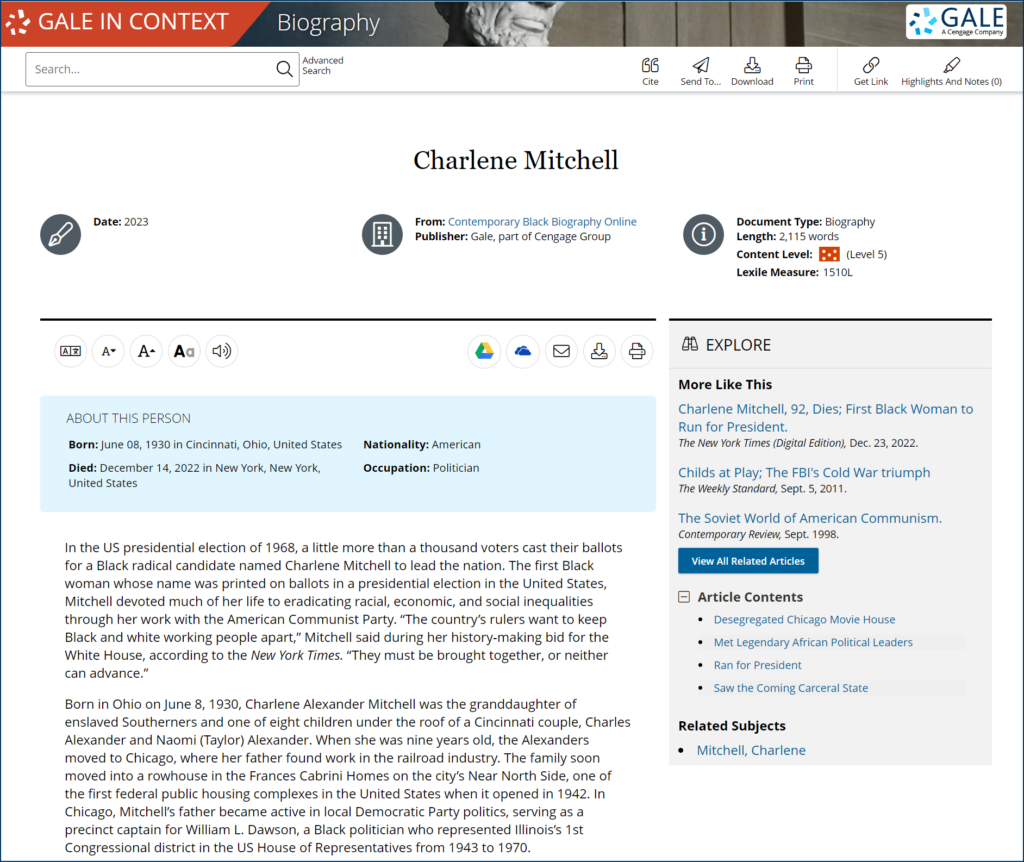| By Carol Brennan |
“The G.O.P.’s Moment of Truth” proclaimed the cover of Time magazine on its issue dated July 29, 1974, as Americans followed with consternation the unprecedented crimes of the Watergate scandal involving multiple Republican officials in the White House of President Richard M. Nixon (1913–1994). The two-term California Republican would resign just days later on August 8, 1974. Crucial to Nixon’s choice of leaving office voluntarily instead of being subject to impeachment by Congress was the unanimous decision of the U.S. Supreme Court on July 24, 1974, that compelled the president to comply with a court order requesting the secret recordings made inside his Oval Office. In drafting the court’s opinion, Chief Justice Warren E. Burger (1907–1995) rejected the claim that the Nixon tapes and other materials were protected by executive privilege.
Elsewhere in the United States 50 years ago this month, prominent Black activists staged a Fourth of July rally in Raleigh, North Carolina, that inevitably drew the interest of the state’s Ku Klux Klan chapters, whose members chose to spend the national holiday at the state capitol with an estimated 5,000 Black North Carolinians and supporters of civil rights. The Raleigh event was organized by the National Alliance Against Racist & Political Repression (NAARPR), whose key figures included Charlene Mitchell (1930–2022), the first Black woman to officially become a candidate in a U.S. presidential election, and civil rights leader Ralph Abernathy (1926–1990), president of the Southern Christian Leadership Conference. The NAARPR’s focus was to warn Black Americans in 1974 about the increasingly significant racial disparities in rates of arrest, conviction, and incarceration, a cause later taken up by legal scholar Michelle Alexander (born 1967) in her 2010 book The New Jim Crow: Mass Incarceration in the Age of Colorblindness.
July of 1974 was a notable month in sports, with West Germany winning the final of the quadrennial FIFA World Cup on July 7 before a home crowd at Munich’s Olympic Stadium in a 2-1 final against the Netherlands. The Germans were captained by Franz Beckenbauer (1945–2024), who went on to coach the team to another FIFA World Cup victory 16 years later. In neighboring France, cycling enthusiasts were following the grueling Tour de France and the emergence of Belgium’s Eddy Merckx (born 1945), who cruised to victory on July 21.
Elsewhere in the world, Argentina mourned the death of Juan Perón (1895–1974) on July 1, but his decision to make his third wife, Isabel Perón (born 1931), his vice-presidential running mate would have catastrophic consequences for the South American economic power. When she was sworn into office, Perón became the first woman in world history to serve as head of state who had not inherited the title by royal succession. Twenty months later, she would be ousted in a military coup that launched one of the most repressive episodes of state-sponsored terror in the modern era known as Argentina’s Dirty War.
In the Mediterranean region, Turkey triggered international condemnation for its July 20, 1974, invasion of the island of Cyprus, claimed by Greece but independent since 1960 and helmed by the powerful Archbishop Makarios III (1913–1977), a senior figure in the Greek Cypriot Orthodox Church. Among those displaced by the conflict in Cyprus were fashion designer Hussein Chalayan (born 1970), whose family settled in London, and the father of artificial intelligence pioneer Demis Hassabis (born 1976).
In what was then the white-minority ruled African nation of Rhodesia, the regime’s decision on July 27, 1974, to launch Operation Overload was met with outrage for its forcible relocation by army personnel of 50,000 Black residents from tribal trust areas and into villages without basic sanitation. Operation Overload did little to quell the ongoing hostilities of the Rhodesian Bush War, or Second Chimurenga, which ended with an independent Zimbabwe led by Robert Mugabe (1924–2019), one of the commanders of Black forces in the Chimurenga along with Joshua Nkomo (c. 1917–1999).
Not surprisingly, the protagonists of major events in July of 1974 were predominantly male. One woman who acted decisively that year, however, was Louisiana congresswoman Lindy Boggs (1916–2013), a Democrat from Louisiana who had been elected to the U.S. House of Representatives in 1973 in a special election to fill the seat of her late husband, a lawmaker killed in a 1972 plane crash. She was given a seat on the House Banking and Currency Committee, which was drafting the Equal Credit Opportunity Act of 1974. It was Boggs who inserted a clause in it—prohibiting discrimination on the basis of “sex or marital status” along with the race, religion, national origin, or age of a credit applicant—in the committee stage, which her colleagues agreed was prudent. The bill passed out of committee and was ratified by Congress on October 28, 1974. The four words Boggs included in the draft bill permanently removed the need for female applicants to obtain their husband or other male relative’s signature when applying for bank loans or any other type of consumer credit.
You can read more about these people and others in Gale In Context: Biography.

About the Author
Carol Brennan has been writing biographical entries for Cengage/Gale since 1993. If she’s not writing, she is either at yoga or walking her dachshund. Carol consumes an alarming volume of podcasts and audiobooks weekly.




